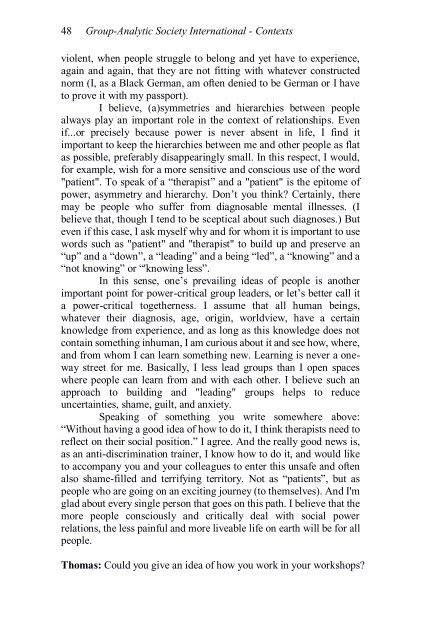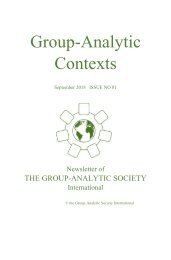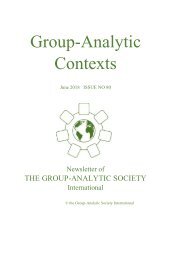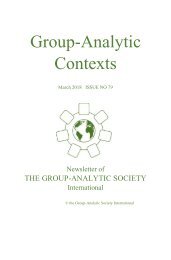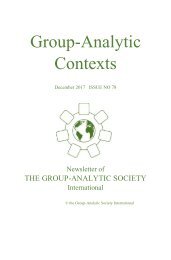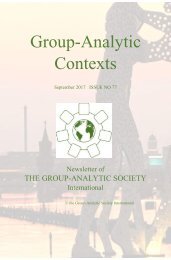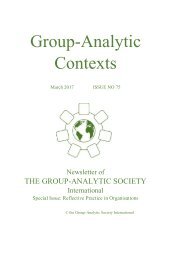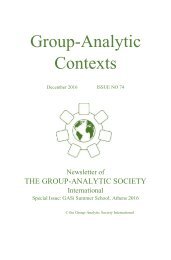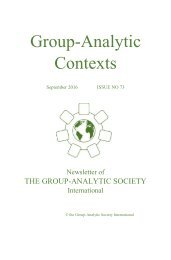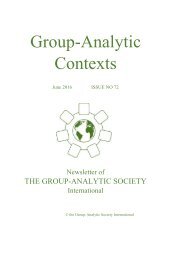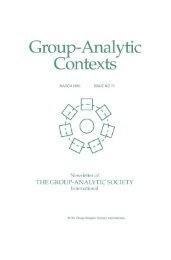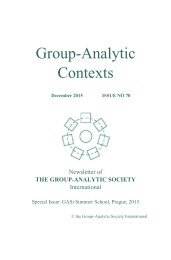Group-Analytic Contexts, Issue 76, June 2017
Special Issue: Preparing for the Berlin Symposium
Special Issue: Preparing for the Berlin Symposium
You also want an ePaper? Increase the reach of your titles
YUMPU automatically turns print PDFs into web optimized ePapers that Google loves.
48 <strong>Group</strong>-<strong>Analytic</strong> Society International - <strong>Contexts</strong><br />
violent, when people struggle to belong and yet have to experience,<br />
again and again, that they are not fitting with whatever constructed<br />
norm (I, as a Black German, am often denied to be German or I have<br />
to prove it with my passport).<br />
I believe, (a)symmetries and hierarchies between people<br />
always play an important role in the context of relationships. Even<br />
if...or precisely because power is never absent in life, I find it<br />
important to keep the hierarchies between me and other people as flat<br />
as possible, preferably disappearingly small. In this respect, I would,<br />
for example, wish for a more sensitive and conscious use of the word<br />
"patient". To speak of a “therapist” and a "patient" is the epitome of<br />
power, asymmetry and hierarchy. Don’t you think? Certainly, there<br />
may be people who suffer from diagnosable mental illnesses. (I<br />
believe that, though I tend to be sceptical about such diagnoses.) But<br />
even if this case, I ask myself why and for whom it is important to use<br />
words such as "patient" and "therapist" to build up and preserve an<br />
“up” and a “down”, a “leading” and a being “led”, a “knowing” and a<br />
“not knowing” or “'knowing less”.<br />
In this sense, one’s prevailing ideas of people is another<br />
important point for power-critical group leaders, or let’s better call it<br />
a power-critical togetherness. I assume that all human beings,<br />
whatever their diagnosis, age, origin, worldview, have a certain<br />
knowledge from experience, and as long as this knowledge does not<br />
contain something inhuman, I am curious about it and see how, where,<br />
and from whom I can learn something new. Learning is never a oneway<br />
street for me. Basically, I less lead groups than I open spaces<br />
where people can learn from and with each other. I believe such an<br />
approach to building and "leading" groups helps to reduce<br />
uncertainties, shame, guilt, and anxiety.<br />
Speaking of something you write somewhere above:<br />
“Without having a good idea of how to do it, I think therapists need to<br />
reflect on their social position.” I agree. And the really good news is,<br />
as an anti-discrimination trainer, I know how to do it, and would like<br />
to accompany you and your colleagues to enter this unsafe and often<br />
also shame-filled and terrifying territory. Not as “patients”, but as<br />
people who are going on an exciting journey (to themselves). And I'm<br />
glad about every single person that goes on this path. I believe that the<br />
more people consciously and critically deal with social power<br />
relations, the less painful and more liveable life on earth will be for all<br />
people.<br />
Thomas: Could you give an idea of how you work in your workshops?


